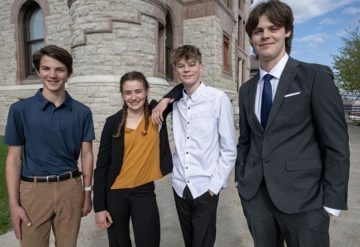Valero and Tollefson in Nature:
 Climate science will get its day in court this week as lawyers for Rikki Held and 15 other young people argue that the state of Montana’s environmental policies promote fossil fuels, in violation of their right to a ‘clean and healthful environment’. That right is enshrined in the state’s constitution, making the climate case — Held v. Montana — the first of its kind to go to trial in the United States, and the latest example of frustrated citizens worldwide taking legal action to force their governments to act on climate change.
Climate science will get its day in court this week as lawyers for Rikki Held and 15 other young people argue that the state of Montana’s environmental policies promote fossil fuels, in violation of their right to a ‘clean and healthful environment’. That right is enshrined in the state’s constitution, making the climate case — Held v. Montana — the first of its kind to go to trial in the United States, and the latest example of frustrated citizens worldwide taking legal action to force their governments to act on climate change.
Numerous climate lawsuits have been filed in the United States, targeting everything from government energy policies to businesses for their responsibility to pay for damages from climate pollution. In the lawsuit against Montana, a large producer of oil, gas and coal, the plaintiffs argue that the state’s long-standing support of fossil fuels violates their fundamental rights under the state constitution. Climate science will feature prominently during the trial, as Kathy Seeley, a Montana judge, seeks to determine whether the state’s policies are “a substantial factor” in driving climate impacts such as droughts, wildfires and extreme weather.
“This is what I expect will be the battle of the experts,” says Michael Burger, executive director of the Sabin Center for Climate Change Law in New York City. In particular, Burger thinks that witnesses will use the field of climate-attribution science — which seeks to quantify climate change’s impact on specific weather and climate events — to bolster the youths’ case.
More here.
